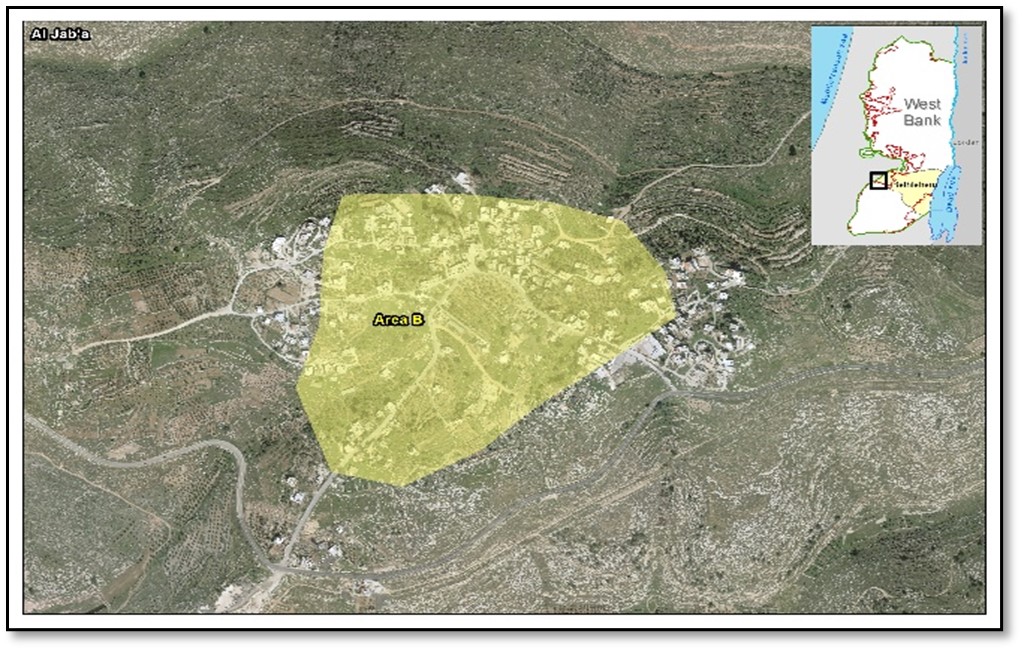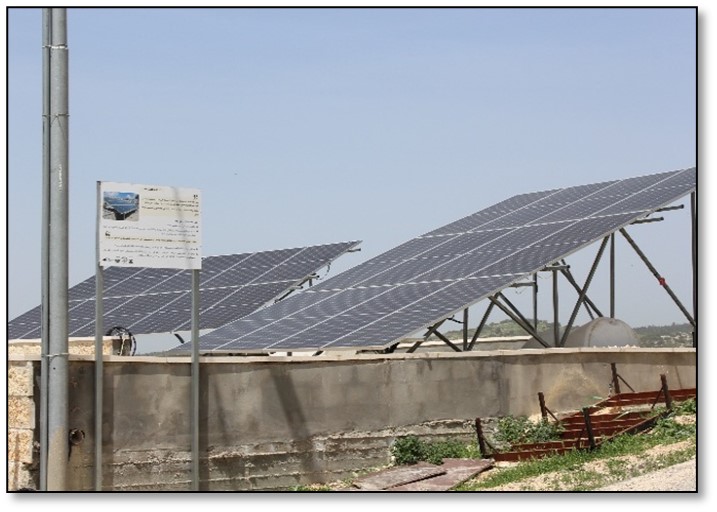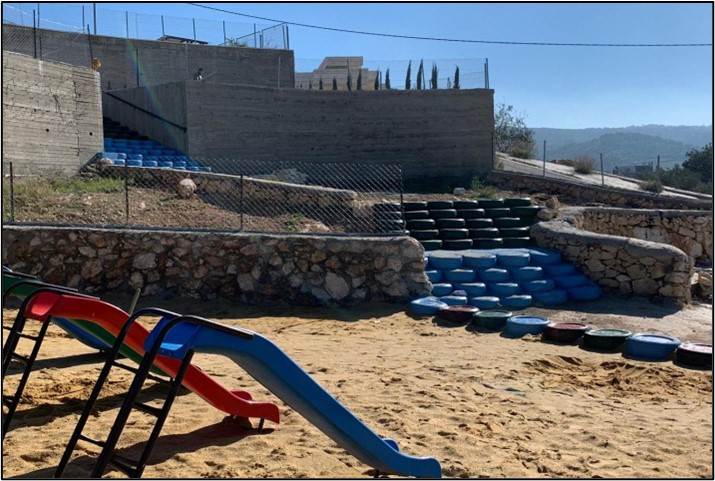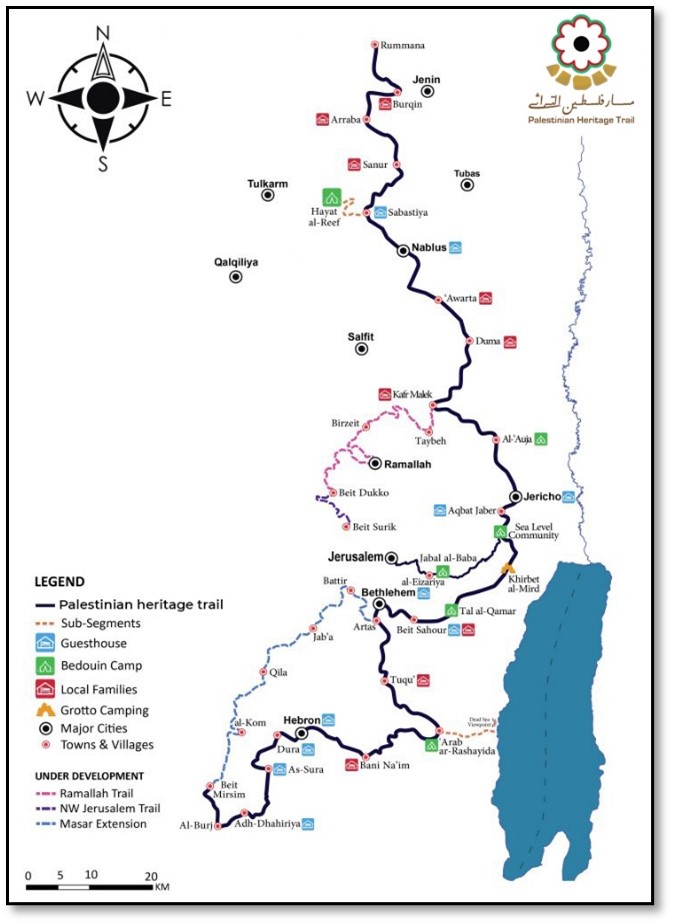Environmental and Climate Justice Programme in Palestine (ECJP)
In a time where temperatures rise, droughts recur, and rainfall declines across the occupied Palestinian territories (oPt), the Israeli Occupation’s colonial practices and systematic violence exacerbate Al Jab’a village’s vulnerability to climate change and climate injustice. The people of Al Jab’a, who are generationally tied to a history of forced displacement from the villages of Al Shajara and Rafat, currently deal with climate change as a modern colonial instrument and obstacle to their existence and survival on the land. Furthermore, the villagers’ plight remains consistent with the past, and the village, which is a home to the Palestinian community present there, has almost entirely been illegally confiscated or expropriated by the Israeli regime.
Map 1: Location map of Al Jab’a
Al Jab’a village, which is located southwest of Bethlehem, deals with regular Israeli land grabs and perpetual damage to its environment by the Occupation. It also continues to be isolated and enclosed by illegal Israeli settlements, which often expand into or risk the expropriation of Palestinian agricultural lands. The Israeli Occupation’s violent practices and climate change impact essentially intertwine in the village, particularly as Israel maintains domination over the people, the land, and the resources available. Subsequently, the people of Al Jab’a are subjected to regular settler violence and climate injustice, both of which hinder the village’s capabilities to conserve the environment. Israeli settler activities have especially diminished both the water sector’s and sustainable agricultural sector’s presence in the village.
Consequently, this gradually increases the severity of the climate crisis on Palestinians and further prevents the village from pursuing measures to combat climate change. For instance, the Israeli Occupation’s efforts to restrict movement and harass the people — through checkpoints, persistent settler attacks, the burning of mosques, the destruction of homes, and the confiscation of sheep/herd — evidently diminishes the village’s ability to develop climate change mitigation strategies and advance sustainability. The consequences have been catastrophic, especially as the village struggles with a considerable decline in its rich biodiversity as well as a significant increase in overgrazing and desertification.
Moreover, the occupation’s multifaceted violence prompted the mission to develop climate resilient practices and provide a safe outlet for the villagers, especially children; a decision merely influenced by fear of harassment by the occupation. The urgency of the deteriorating environmental situation in Al Jab’a village made it especially imperative to implement the Environmental and Climate Justice Programme (ECJP) — per the Applied Research Institute – Jerusalem (ARIJ) in particular. The Applied Research Institute — Jerusalem (ARIJ) intervened in the village to implement eco-friendly initiatives and promote self-sustainable models, both of which aim to increase awareness, reduce climate change impact, and challenge the Israeli Occupation’s barriers in the village.
The ECJP is a coalition of six environmental/agricultural non-governmental organizations that work to attain environmental justice for Palestinians. The Programme acknowledges and approaches Al Jab’a village through a political and environmental lens, and it particularly aims to ensure that the people have access to a safe and healthy environment. Its mission, thus, aims to produce a sense of development and authority in Al Jab’a village, specifically within the scope of climate justice and community/capacity building. Further, to ensure the success of the village’s sustainable development, the Applied Research Institute – Jerusalem (ARIJ) sought, in cooperation with the citizens there, to create an eco-friendly park.
The purposes of this park include, but are not limited to the following: promotion of public environmental awareness, reduction in pollution and deforestation, initiation of waste management, and adaption of recycling and other environmentally friendly practices.
In addition, the Applied Research Institute – Jerusalem (ARIJ) worked on several features in this park. The most significant of the features installed are the solar energy units, which operate a power station, the wastewater treatment plant and its utilization to water crops grown in the region, as well as the production of containers to segregate garbage. These development projects work to empower the people of Al Jab’a, and specifically aim to inspire and create a sustainable, eco-friendly culture. It also seeks to advance the resilience of the people, equip the village with the appropriate resources and tools, and transform the village’s environment to be suitable and safe for tourist and public use.
Another key Pilot target is the Palestinian Heritage Trail, which has been central to confront Israeli settler activities and the illegal Israeli settlement enterprise. The trail runs through Al Jab’a village and 50 Palestinian cities, and every year locals and visitors hike on this trail as a form of resistance to the prolonged Israeli occupation and its illegal annexation plans. The trail also depicts Palestinian heritage and the Palestinian indigenous connection to the environment. Accordingly, to preserve Palestinian history, the Applied Research Institute – Jerusalem (ARIJ) maximised sustainable and environmental technologies on this trail to develop a safer and easier environment on the trail’s routes. Key eco-friendly technological advancements – to sustain the tourist and hiker activity on this trail – included the development of renewable energy, solid waste recycling and composting, and the installation of solar panels. Furthermore, the Environmental and Climate Justice Programme has ensured that Al Jab’a village remains resilient in the face of the Israeli Occupation’s colonial and dispossessory practices.
©phtrail.org






